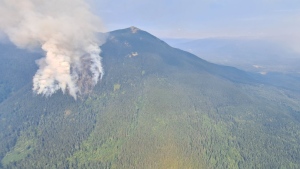The recent wet weather in British Columbia has brought some relief to the ongoing fire fight in the southern part of the province. While the north continues to experience warm and dry conditions, the south has seen some much-needed precipitation.
According to the BC Wildfire Service, the rain and cooler temperatures have helped to decrease fire activity and allow crews to make progress in containing the blazes. As of now, there are 245 active wildfires burning in the province, with 12 of them being classified as “wildfires of note.”
In the southern region, the largest fire is the Sparks Lake fire, which has burned over 65,000 hectares of land. However, the recent rain has helped to slow its growth and allow firefighters to establish containment lines. The same can be said for the other major fires in the area, including the Brenda Creek and White Rock Lake fires.
Meanwhile, in the northern part of the province, the warm and dry conditions continue to pose a challenge for firefighters. The largest fire in this region is the Lutz Creek fire, which has burned over 50,000 hectares of land. Crews are working tirelessly to contain the blaze, but the lack of rain and high temperatures are making it difficult.
Despite the challenges, the BC Wildfire Service remains optimistic and is grateful for the recent wet weather in the south. They are also reminding the public to continue to be cautious and follow all fire safety measures, as the fire season is far from over.
In addition to the wet weather, the BC Wildfire Service is also receiving support from other provinces and countries. Over 3,000 personnel, including firefighters, support staff, and contractors, are currently working on the frontlines. This includes crews from Alberta, Saskatchewan, Ontario, and Mexico.
As the fire fight continues, the BC Wildfire Service is urging residents to stay informed and be prepared for any potential evacuations. They also remind everyone to do their part in preventing human-caused fires, as they can be devastating to both the environment and communities.
In conclusion, while the north of British Columbia continues to face warm and dry conditions, the recent wet weather in the south has provided some much-needed relief for the ongoing fire fight. With the help of dedicated firefighters and support from other provinces and countries, the BC Wildfire Service remains committed to containing and extinguishing these fires.



